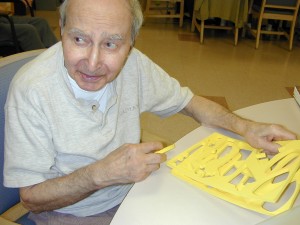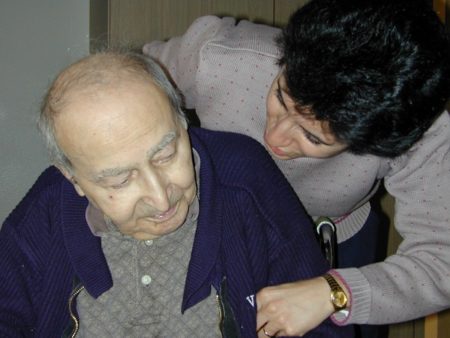 After my father who lived Alzheimer’s lost his ability to be understood, I tried even harder to adapt caregiver communication skills so we could connect.
After my father who lived Alzheimer’s lost his ability to be understood, I tried even harder to adapt caregiver communication skills so we could connect.
Then both of us seemed to make a discovery.
It had been there all along – my father had found an alternate way to connect and I would soon join him.
It’s All About the Emotions
After a difficult week wrangling estate-related legal and financial issues against a backdrop of uncooperative siblings, I gathered enough strength to greet him with a smile and joyful tone.
I tried being as upbeat as appropriate and he often mirrored with a smile. After all, who wants to spend time with a dour sourpuss?
“Are you okay,” he asked?
The clarity of his question caught me off guard as he had been speaking unintelligibly for some time.
“Uh-well, I…”
“How are you?”
Is this my father? What happened to Alzheimer’s?
“Well, not as good as I hoped. All this paperwork is making me crazy.”
“Well, forget about it for a while.”
What?
Beyond his advice, I was taken by his perceptive assessment of my emotional state and his coherent replies. Just like that – out of the blue.
Alzheimer’s Rollercoaster
 It’s not surprising that caregivers wonder if their loved ones are faking cognitive impairment; especially, when they respond lucidly.
It’s not surprising that caregivers wonder if their loved ones are faking cognitive impairment; especially, when they respond lucidly.
And just as the window opened to allow two people to connect, it closed abruptly. In an instant, he was gone and back to the unintelligible expression or aphasia. The highs give us strength, hope, and joy. The lows hurt deeply.
As Alzheimer’s disease drags people deeper into cognitive decline, we have to keep our eyes open to find other ways to connect.
- They may forget that you visited.
- They may forget they just ate.
- The one thing they won’t forget is how you make them feel.
- If you smile, speak and even touch them gently, they feel safer with you.
- If they feel you’re connecting with them and affirming their view of the world, they’ll feel comfortable with you.
[8/12/2024 TCV Update Jenn Sinrich’s article URL is broken: Ways to Maintain an Emotional Connection with an Alzheimer’s Patient- Reader’s Digest]
View this two-minute animated short by Rachael Wonderlin of Dementia by Day [2/11/2025 TCV Updated URL] to help us foster more rewarding communications with people with dementia.









Thank you for posting this article,Brenda.
My mother lived with Alzheimer’s for over eight years. After she could only speak gibberish we communicated with broad smiles, hand-holding, and hugs and kisses. It was beautiful.
Individuals who live with advancing Alzheimer’s can indeed have moments of clarity. Years into her disease, my mother no longer knew who I was. She adamantly stated that she had no children. Then her aide recently asked her whether she knew who I was.. She unhesitatingly said, “That’s my son Arnie.”
Mom lost her battle her battle to Alzheimer’s on November 23. But she passed knowing that she was loved, safe, and protected.
What a touching testinomy of unconditional love.
Thank you for sharing, Arnie.
Thank you, Susan Macaulay for “intuitive clairvoyance.” Can we ever know the full potential of humanity? And it’s good to remain humbly open to such possibilities.
Thank you, Assisted Living Prescott for sharing your Alzheimer’s test. At the very least, it gives families points to focus on before seeking a professional assessment by a team including a neurologist, gerontologist, and psychiatrist or psychologist.
Great article Brenda! I’ve been following your work for some time and I am always more and more inspired to do what I do and I always refer to your book “Where’s my shoes”. 🙂
I recently opened a small assisted living home in Prescott and Sedona, Arizona. Although we are providing care for aging seniors in our community, my mission is to bring more awareness to Alzheimer’s and how to properly deal with it. We started offering assisted living after my grandmother suffered from Alzheimer’s and dementia. It was a very sad time for us and after she passed we learned that nearly everyone she knew was suffering from the same illness. I believe the key is to catch it in time and with the proper training, supplementation and brain exercises we can slow the process down. I ever created a test that we ask everyone to take so they can clearly see in a Yes/No format if their loved ones are experiencing some form of memory loss.
Assisted Living Prescott – alzheimers-test.[11/24/2017: Link is broken – removed.]Thanks again for all your wonderful work Brenda!
I often experienced this kind of thing with my mother. I believe they are ALWAYS there and able to understand, but frequently cannot articulate thoughts. I called my mother’s ability to somehow know things that were impossible for her to know “intuitive clairvoyance.” I think the veil between this reality and the spirit world gets thinner and in some ways communication/knowing/awareness is enhanced. One example here: http://myalzheimersstory.com/2015/03/10/heaven-can-count/
A brilliant sharing! What a joy you created with your dad- ready and willing and able to catch the twinkling stars he sent to you! How beautiful! As a recreation therapist who specializes in the performing arts- I have been able to create NEW twinkling stars and new communication! Through my new film which combines beautiful music and vibrant colorful original photos – I have the gift to smile with my patients and SEE them smile too!! My patients have taught me patience, how to really listen from nothing- a clean canvas, and how to continually create a new pathway to their heart, their brain and their coursge🌹
Thank you, Marianna for sharing yet another way to connect with our loved ones.
Our senses are powerful channels for communicating, connecting, and bonding.